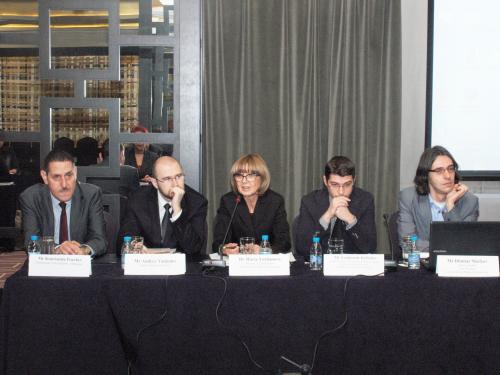 On 19 January 2015, the Center for the Study of Democracy held, in Sofia, an international conference on "Re-socialization of Offenders in the European Union: Enhancing the Role of Civil Society". The event saw the participation of experts from Belgium, Germany, Spain, Lithuania, Italy, legal professionals and representatives of state institutions and civil society in Bulgaria, including Mr. Andrey Yankulov, Deputy Minister of Justice, Mr. Konstantin Penchev, Ombudsman of the Republic of Bulgaria, Mr. Lyubomir Krilchev, Director of the National Preventive Mechanism and Fundamental Rights and Freedoms Directorate, and Mr. Rosen Zhelyazkov, General Director of the General Directorate Execution of Penalties.
On 19 January 2015, the Center for the Study of Democracy held, in Sofia, an international conference on "Re-socialization of Offenders in the European Union: Enhancing the Role of Civil Society". The event saw the participation of experts from Belgium, Germany, Spain, Lithuania, Italy, legal professionals and representatives of state institutions and civil society in Bulgaria, including Mr. Andrey Yankulov, Deputy Minister of Justice, Mr. Konstantin Penchev, Ombudsman of the Republic of Bulgaria, Mr. Lyubomir Krilchev, Director of the National Preventive Mechanism and Fundamental Rights and Freedoms Directorate, and Mr. Rosen Zhelyazkov, General Director of the General Directorate Execution of Penalties.
The conference was part of a project, implemented with the support of the European Commission, Directorate‐General Justice, and aimed at improving the situation in prisons and the re-socialization of offenders by exploring three aspects – promoting the broader use of alternatives to sentences of imprisonment; improving the situation of specific groups of vulnerable inmates; and designing an instrument for regular prison monitoring.
The conference provided an opportunity to present the aims, indicators and data collection methodology as well as the pilot testing results of the Prison Conditions Monitoring Index (PCMI) developed within the project's framework. Participants highlighted the relevant perspective of integrating the PCMI with other existing models or standards, including those developed by the Bulgarian General Directorate Execution of Penalties, in order to create a working and applicable tool. This could have a critical impact, also in light of the new strategy for judicial reform adopted by the Bulgarian government, which for the first time includes the protection of human rights amongst its explicit objectives.

The conference was also dedicated to discussing, in view of a EU comparative perspective, the legal framework and implementation of independent and effective prison monitoring mechanisms aimed at protecting prisoner's rights; the need to assess the scope and effectiveness of "alternative sentences to imprisonment" (i.e. non-custodial or ambulant sanctions), in particular in respect of their re-socialisation objective and their potential penal net-widening effect; the adoption of adequate measures to address the needs of specific vulnerable groups of inmates, including juveniles and drug addicts; the critical role that civil society organisations can play in the implementation of such measures as well as in the ambulant sanctions system and the supervisory bodies for detention conditions.

- Program of the Conference
- For further information click here
The conference is part of the “Re‐Socialisation of Offenders in the European Union: Enhancing the Role of the Civil Society” project, implemented by the Center for the Study of Democracy, in partnership with Droit au Droit (Belgium), University of Applied Sciences and Arts – Dortmund (Germany), Observatory on the Penal System and Human Rights (Spain) and Law Institute of Lithuania (Lithuania) and with the support of the European Commission, Directorate‐General Justice.





